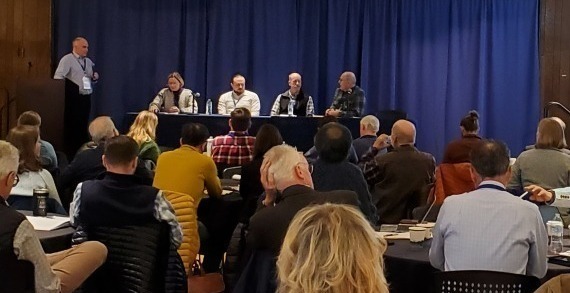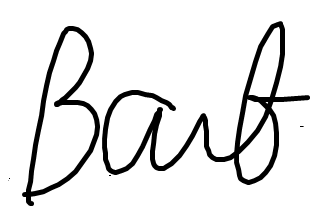|

Hi Barb,
Sometimes I wonder if I was really meant to be a scientist or a person who supports scientists.
Usually, these doubts surface after what feels like a failure. For example,
- last fall when I missed the mark about what scientists would be willing to do in a conference (details here) or
- during grad school when I submitted the first draft of my thesis (details here).
Discouragement about "failing" is real. To get through it, I need to feel that feeling, and not try to "figure it out" like a scientist would (LOL).
It can take a while, but eventually, I forgive myself for being imperfect or for trying something that didn't work. Then, I can choose what I can do to improve.
What I've learned:
- What turns our mistakes into failures is not learning from what happened.
- Learning comes from deliberate practice of a tiny change, not from nursing shame or trying to make a big dramatic change.
- And, asking for help makes learning happen faster.
Therefore -- May I ask for your help? Whether you are a conference attendee, presenter or planner, I would love to hear your ideas for improving conferences by making them more engaging.
You can send me your ideas by email, OR better yet, by coming to Reimagining Conferences: More Connection, Less Lecture this Wednesday evening, May 14th. The link to sign up is in "Courses and Resources," below.
Thanks!
Warmly,

Barb Bickford
Reimagining Conferences: More Connection, Less Lecture
-- Online, Wednesday, May 14th, 6 - 7:30 EDT / 5 -6:30 PM CDT / 3-4:30 PDT (no cost)
Conferences are full of potential—so why do they often feel flat and forgettable? Or worse, overwhelmingly stressful? How can we foster more connection and less passive listening in large meetings?
In this interactive session, we’ll uncover what gets in the way of authentic engagement and generate practical ways to make conferences more participatory and energizing.
Whether you run events, attend them, present at them or influence them from the sidelines, you’ll leave with ideas worth sharing and implementing. Sign up and mark your calendar! And, if you know a conference planner, invite them to join you.
Vitalizing Health, Care, and Community with Liberating Structures
-- Online, May 29 and June 12, 2025
Liberating Structures (LS), simple yet powerful methods that change how people work together, has deep roots in health contexts. Much of the earliest development and testing of the methods took place in healthcare settings.
In these sessions, you will delve into the relationship between LS and health, examining its potential at every level—from personal well-being to community resilience and the broader structures that shape care. There will be a lively mix of direct practice, novel experiences, and animating stories and examples that expand everyone's sense of what might be possible. Sign up here!
Transitions and New Beginning retreats - save the dates!
-- February 4-8, 2026 in Sun City West (near Phoenix), Arizona
-- April 17-19, 2026 at St. Anthony's Spirituality Center, Marathon City, Wisconisn
-- We are looking for hosts for day-long Transitions events for 6-12 people. Please reply to this email if you are interested.
Related blog posts
-- How to create more engaging conferences
-- Balancing conversations and presentations in science conferences
-- From stoning to building: How to energize science meetings
(this is a guest editorial I wrote for the professional journal Ground Water)
Our upcoming events, workshops and courses
Aim for progress not perfection
If you are reading this, I assume you want better meetings. In my view, better meetings occur when people trust one another, listen well, feel heard, share their great ideas, and make collaborative decisions everyone can support.
But when dealing with something as complex as meetings, fixing them by trying something once or by forcing big changes can backfire, and that can feel like failure.
In those times, we have a choice: we can fail to learn or we can learn to succeed.
How do we succeed at improving our meetings?? By making small deliberate changes to how we plan them and run them.
Here are three specific small changes that encourage active participation in meetings:
- Ask everyone to speak in the first 5 minutes. Hearing their own voices helps them engage later. Speaking by saying their name, reading from an established script, or answering a simple question is often enough.
- Help participants connect to themselves, each other and the purpose of the meeting. Do this early in the meeting to help focus everyone's attention. Investing 5 minutes can do wonders. You can save time by doing this in pairs in person or in breakout rooms online.
-
Allow time for silent thinking before every discussion. This enables everyone (not just the ones who tend to jump in) to make thoughtful contributions, which in turn will lead to better outcomes.
This tip is: Learn to succeed by choosing incremental progress over perfection. Choose one way to improve your meetings and practice it until it becomes a habit. Not a perfect habit, but a habit.
How do you intend to improve your meetings? Please reply and share. I'd love to hear about it and cheer you on!
====================
PS: In my last newsletter email, I invited readers to share the small simple things they do to care for the earth and themselves self. Here are a few of the responses:
| |
- We save water by using rainbarrels and applying mulch.
- In 2024 we added 32 solar panels to our roof (currently generating 5-7 kW on average) and in 2025 we purchased a solar garden share & will save at least 10% on electric bills for 25 years.
- We drive an EV and hybrid auto
- We use our high-draw appliances only between 9 pm and 9 am
- Never use chemicals on our lawn & do not irrigate
- We plant pollinator-friendly plants (x2)
- Use programmable thermostats (x2)
- Read all newspapers and magazines online
- Since 1988 during a terrible drought, my husband and I started saving shower and tub water for flushing. It saves thousands of gallons of fresh water and uses gray water practically.
- I pay attention to what I'm buying and from whom. Companies that prioritize minimizing their environmental impact get my business.
- We grow our own foor or buy local food to minimize the use of energy for transportation (x2)
-I'm rethinking the whole idea of accumulation and consumption. How much is REALLY enough? How can I share what I have with those who need it?
|
These are examples of how small actions, taken collectively and done consistently, DO make a difference!
Want even more tips? Access Ten Tips to Foster Online Engagement.
If you were forwarded this newsletter email, you may subscribe here.
You can also sign up for topics that you want to hear more about.
Photo Credit: Barb Bickford
|